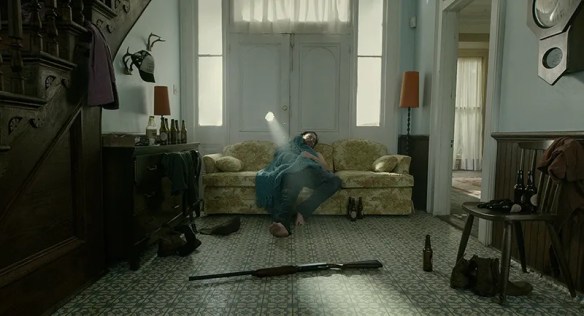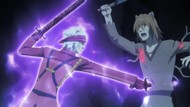Hello folks, and welcome back to Wrong Every Time. This week I’ve been continuing my brave journey through Sailor Moon, completing Sailor Moon S and trekking perhaps two-thirds of the way through SuperS. It hasn’t always been easy; the episodic pleasures of hanging out with the girls remain a delight, but the overarching narrative has shifted from “tedious” to “actively aggravating,” with SuperS for some reason introducing a horse that Chibi Usa is in love with. The further I get into this series, the more an idea of a “manga-faithful remake” like Crystal seems utterly absurd to me; though Takeuchi built a fine initial template, basically all of her narrative ideas are a net negative, with the entirety of the show’s strength coming down to its adapted brilliance. I’m hoping the show’s final season has a better conceit than this goddamn horse, but in the meantime, we’ve got some films to get through. Let’s get to it!
First up this week was a unique film that somewhat optimistically bills itself as a horror-romance, the 2019 feature After Midnight. The film centers on a thirty-something man named Hank, who lives in a backwater town in central Florida. After his girlfriend Abby mysteriously disappears, leaving only a vague note in the kitchen, Hank finds his home under attack by some strange, menacing animal. Night after night, Hank barricades the doors against this feral threat, while his days are spent reminiscing on the halcyon days of his and Abby’s relationship.
I say “somewhat optimistically” because it’s a little tricky to qualify After Midnight as a genuine horror film; the beast that stalks Hank is treated as a metaphor more often than not, though there are indeed some moments where a spooky creature enters the frame. What After Midnight actually is is more of a comedy-romance-character study, wherein we are slowly inculcated into the pace and priorities of Hank’s current life, only to have that perception of the situation upended by Abby’s eventual return. I felt the film frankly lingered a bit too long in its first act; I had basically gotten the gist of Hank and Abby’s early years by the third montage of Dead Wife Photography, and was reaching the point of frustration with the film by the time it flipped the script.
Fortunately, that script-flip is effective as all hell, and the film’s last setpieces rise to devastating crescendos of acting and character writing. There’s one shot of Hank and Abby litigating their relationship that must have gone for eight minutes without a cut, with full battles of contrasting desire redrawing the contours of their bond all the while. After Midnight stretches its conceptual gimmick near to the breaking point, but its last act is so effective that it left me angrily wiping tears away, almost annoyed that the film got so sharp so fast. I can’t give it a full general recommendation, but for people who like genre blends or character studies, it’s a strong choice.
Our next viewing was Piggy, a recent Spanish feature centering on a girl named Sara (Laura Galán) whose classmates bully relentlessly about her weight. Eventually, Sara finds an unexpected protector in the form of a serial killer, who possesses no compunctions against graphic murder, but seems to have a soft spot for Sara. Still, serial killers make for dubious guardian angels, and thus Sara must eventually fight back against her would-be savior.
Though it’s billed as a horror film, it takes until the film’s last twenty minutes or so to really let loose with its Texas Chainsaw-indebted murder theatrics. What comes before that is subtle, oddly funny, and consistently heartbreaking, as we explore the dispiriting daily life of Sara. Writer-director Carlota Pereda captures the tiny hills and staggering valleys of Sara’s existence with skill and sincerity, demonstrating how Sara’s condescending mother often cuts deeper than her hateful peers, and ably conveying the calculations of anxiety and abuse constraining Sara’s ability to live her life. Galán’s performance is remarkable from the start, and only gets more impressive when she shifts from a victim to an expertly calculating co-conspirator, always revealing just enough of the truth to allay suspicion and engender sympathy. The film transitions from character drama to winking thriller to grindhouse excess, with both Pereda and Galán seeming equally comfortable in all three genres. An altogether excellent film.
We then checked out Mughal E Azam, a classic Bollywood feature about a young prince who falls in love with one of his court’s slaves, to the great frustration of his legacy-minded father. There’s certainly plenty of room for engaging drama there, but I unfortunately found the film’s perspective too distant and too broad to emotionally resonate with.
For one thing, in spite of the film largely being concerned with romance, there really isn’t any romance between its two leads. It’s purely “love at first sight” transitioning into paeans of star-crossed longing, with no actual chemistry or charm between our leads to convince us why they should be together. Beyond that, the father’s position shifts from obstinate to ludicrous as his arguments stretch, with “my son must not demean the family by marrying a slave” eventually leading to “I will kill my son and destroy my line before I let him marry who he wants.” The film clearly intends us to see his father as a complex and conflicted figure, but without a background of genuinely believing in a class-stratified society, it’s hard to see him as much more than a cruel oaf. A beautifully designed film, but not one I could in any way relate to.
Last up for the week was Hidden Strike, a Jackie Chan/John Cena feature in the style of prior Chan collaborations like Rush Hour and Shanghai Noon. Chan stars as a legendary soldier leading a convoy out of an Afghan oil refinery, while Cena is an American veteran who gets roped into attacking the convoy with a group of mercenaries under false pretenses. After trading blows through the first half of the film, the two eventually establish their inevitable partnership, and proceed to blast and kick the shit out of their loosely defined antagonists.
There is an inescapable air of fatigue hovering above Hidden Strike, and it’s not just a result of Jackie Chan being far too old to either sell this role or perform his own stunts. Though its elevator pitch is obviously “Chan and Cena in a buddy action film,” Hidden Strike takes close to an hour for the two to actually meet, instead building up unnecessary secondary characters and wallowing in unconvincing CG riffs on Fury Road. The CG in general is a damning crutch; Hidden Strike suffers from a Marvel-tier absence of location shooting, making it abundantly clear our actors are only ever emoting in front of a green screen, and thereby draining any of the tension inherent in actors performing actual stunts.
Fortunately, Chan and Cena are both intensely charismatic actors, and their shared scenes manage to ignite that dormant flame of buddy camaraderie inherent in many of Chan’s best roles. And though much of this film’s secondary drama is wholly extraneous, I actually quite liked how Cena and our villain’s motivations reflected two complementary sides of post-war grievance and injustice. Neither of these virtues are substantial enough to earn the film a recommendation, but I’m personally thankful it wasn’t an utter waste of time.




